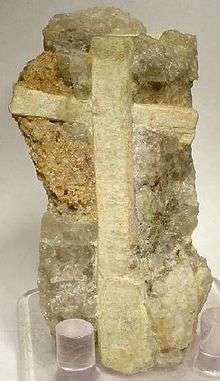Meionite
Meionite is a tectosilicate belonging to the scapolite group with the formula Ca4Al6Si6O24CO3[5]. Some samples may also contain a sulfate group. It was first discovered in 1801 on Mt Somma, Vesuvius, Italy. It was named by Rene Just Haüy after μειωυ, the Greek word for less, in reference to the less acute pyramidal form as compared to Vesuvianite.
| Meionite | |
|---|---|
 Meionite (scapolite) crystals (cross-shaped) in a quartz matrix, 7.2 x 4.0 x 3.0 cm. Worcester County, Massachusetts. | |
| General | |
| Category | Tectosilicate Scapolite group |
| Formula (repeating unit) | Ca4Al6Si6O24CO3 |
| Strunz classification | 9.FB.15 |
| Crystal system | Tetragonal |
| Crystal class | Dipyramidal (4/m) (same H-M symbol) |
| Space group | I4/m |
| Unit cell | a = 12.179(1) Å, c = 7.571(1) Å, Z = 2 |
| Identification | |
| Color | Colorless, white, grey, pink, violet, blue, yellow, orange-brown, brown |
| Cleavage | Distinct/good on {100}{110} |
| Fracture | Irregular/uneven, conchoidal |
| Tenacity | Brittle |
| Mohs scale hardness | 5 - 6 |
| Luster | Vitreous, resinous, pearly |
| Streak | White |
| Diaphaneity | Transparent, opaque |
| Specific gravity | 2.74 - 2.78 |
| References | [1][2][3][4] |
References
- Mineralienatlas
- Mindat.org
- Webmineral.com
- Handbook of Mineralogy
- Teertstra, David K.; Sherriff, Barbara L. (1997-04-25). "Substitutional mechanisms, compositional trends and the end-member formulae of scapolite". Chemical Geology. 136 (3): 233–260. doi:10.1016/S0009-2541(96)00146-5. ISSN 0009-2541.
| Wikimedia Commons has media related to Meionite. |
This article is issued from Wikipedia. The text is licensed under Creative Commons - Attribution - Sharealike. Additional terms may apply for the media files.